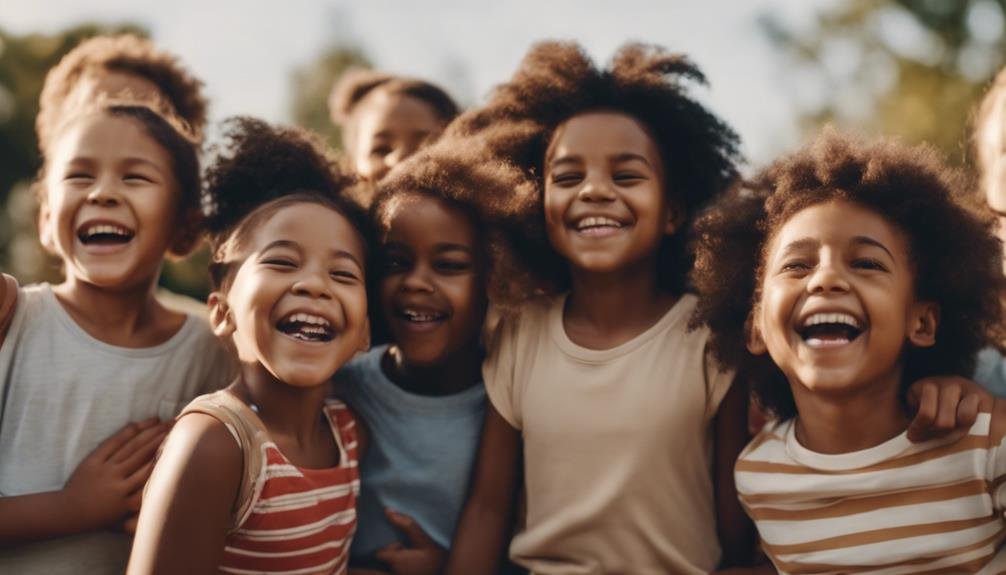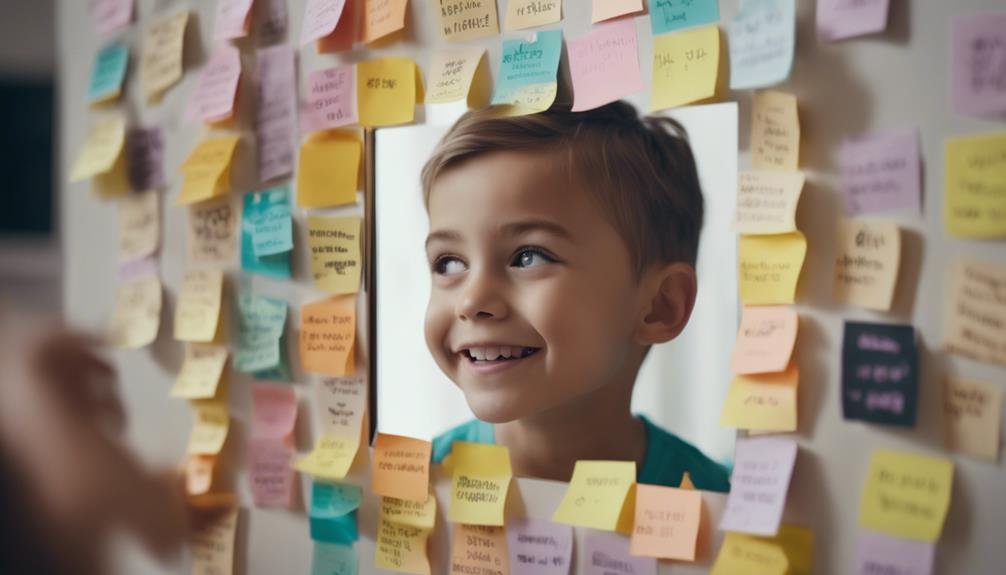"Cherishing Little Steps - A Haven for Baby and Family Journeys"
Cultivating a Positive Body Image in Young Children
When it comes to fostering a positive body image in young children, the impact can shape their entire worldview. Imagine a world where every child feels confident and comfortable in their skin, embracing their uniqueness with pride.
This journey begins with understanding the pivotal role parents and caregivers play in instilling these values. By setting a foundation of healthy self-talk and promoting media literacy, we pave the way for children to navigate society's beauty standards with grace.
Stay tuned to uncover practical strategies for nurturing a positive body image that will stay with them for life.
Key Takeaways
- Parents should prioritize inner qualities over appearance for positive body image reinforcement.
- Encourage healthy self-talk with uplifting affirmations to boost self-esteem and resilience.
- Teach children media literacy to challenge unrealistic beauty standards and embrace diversity.
- Promote physical activity and balanced nutrition for overall well-being and confidence in young children.
Importance of Positive Body Image

Understanding the significance of fostering positive body image in young children is essential for their overall well-being and self-confidence. Body positivity plays a critical role in shaping how children perceive themselves and the world around them. As children develop, their self-esteem building is heavily influenced by the way they view their bodies. Encouraging a positive body image early on can help them feel comfortable and confident in their own skin.
Promoting body positivity in young children involves celebrating their uniqueness and teaching them to appreciate their bodies for what they can do rather than how they look. By fostering a healthy relationship with their bodies, children are more likely to develop a strong sense of self-worth and resilience. It's important to emphasize that beauty comes in all shapes, sizes, and colors, instilling a sense of acceptance and inclusivity from a young age. By nurturing a positive body image, children can grow up with the confidence to navigate the complexities of the modern world with grace and resilience.
Role of Parents and Caregivers
Parents and caregivers play an essential role in nurturing positive body image in young children by modeling healthy attitudes towards their own bodies and providing a supportive environment for self-acceptance and appreciation. Your actions and words greatly influence how your child perceives their own body. Here's how you can support them:
- Positive Reinforcement: Encourage and praise your child for their inner qualities and actions rather than focusing solely on appearance.
- Lead by Example: Show your child that you value and respect your own body by practicing self-care and speaking positively about yourself.
- Open Communication: Create a safe space for your child to express their feelings about their body without judgment or criticism.
- Celebrate Differences: Emphasize the beauty in diversity and teach your child to appreciate the uniqueness in themselves and others.
Encouraging Healthy Self-Talk

Fostering a mindset of self-compassion and positivity is key to nurturing healthy self-talk in young children. Positive affirmations play a vital role in building their self-esteem. Encouraging your child to use kind and uplifting words when talking about themselves can have a major impact on their self-perception. Start by incorporating phrases like, 'I am strong,' 'I am kind,' or 'I can do hard things' into their daily routine. By consistently reinforcing these positive affirmations, you help them internalize a sense of worth and capability.
It's important to model healthy self-talk yourself. Children learn by example, so demonstrating self-compassion and speaking kindly about yourself can teach them to do the same. Encourage open conversations where your child can express their feelings and thoughts without judgment. By creating a safe and supportive environment, you foster a positive self-image and help them develop resilience in the face of challenges. Remember, building healthy self-talk takes time and patience, but the impact on your child's well-being is immeasurable.
Media Literacy and Body Image
Encouraging children to critically analyze media portrayals of bodies can empower them to cultivate a positive body image. In today's media-saturated world, helping young ones develop critical thinking skills is vital in navigating through unrealistic beauty standards and unattainable body ideals. Here are some key points to keep in mind:
- Questioning Perfection: Teach children to question the idea of a 'perfect' body portrayed in media and assist them in understanding that beauty comes in diverse shapes and sizes.
- Identifying Photo Editing: Help kids recognize the prevalence of photo editing in images, highlighting that many images aren't true representations of reality.
- Promoting Diversity: Encourage children to seek out media that showcases a variety of body types, skin colors, and abilities, promoting inclusivity and body positivity.
- Emphasizing Inner Qualities: Shift the focus from physical appearance to inner qualities like kindness, intelligence, and creativity, reinforcing that true beauty comes from within.
Promoting Physical Activity and Nutrition

Exploring the world of media literacy and body image, it's important to contemplate how promoting physical activity and nutrition can further enhance young children's overall well-being and self-perception. Encouraging healthy habits from a young age sets the foundation for a lifetime of wellness. Engaging in regular physical activity not only strengthens the body but also boosts mood and confidence. It instills a sense of accomplishment and teaches discipline, fostering a positive body image.
Similarly, emphasizing the importance of a balanced diet is vital. Introducing a variety of fruits, vegetables, whole grains, and lean proteins not only nourishes the body but also educates children about making nutritious choices. A balanced diet supports growth and development, ensuring that children have the energy to thrive in all aspects of their lives.
Building Self-Confidence and Resilience
To help young children build self-confidence and resilience, it's important to provide them with a supportive environment that promotes autonomy and personal growth. Encouraging them to embrace their individuality and strengths can greatly contribute to their self-esteem development and foster a sense of body positivity.
Here are some key ways to support your child in building self-confidence and resilience:
- Encourage Exploration: Allow your child to try new activities and experiences, helping them discover their interests and capabilities.
- Provide Positive Reinforcement: Offer praise and encouragement for their efforts and accomplishments, reinforcing their self-worth.
- Teach Problem-Solving Skills: Help them develop resilience by teaching them how to navigate challenges and setbacks effectively.
- Promote Self-Care: Encourage healthy habits and self-care routines that contribute to their overall well-being and self-confidence.
Frequently Asked Questions
What Are Some Effective Ways to Address Body Image Concerns in Young Children Without Triggering Negative Emotions or Behaviors?
When addressing body image concerns in young children, consider body positivity workshops for kids, role-model healthy behaviors, practice mindful eating, and encourage outdoor play. These activities can promote a positive self-image and overall well-being.
How Can Parents and Caregivers Navigate Conversations About Body Image With Their Children in a Way That Promotes Self-Love and Acceptance?
As you navigate body image talks, remember: "Actions speak louder than words." Show love for all bodies! Use positive reinforcement, promote body positivity. Build trust through open, supportive chats. Encourage self-love, acceptance. Your words matter!
Are There Specific Resources or Tools Available for Parents to Help Educate Themselves and Their Children About Media Influence on Body Image?
To understand the impact of media on body image, seek resources on media literacy. Parents, guide conversations about body positivity and self-worth. Use educational tools to empower children. Embrace dialogue that fosters healthy perspectives and self-acceptance.
What Are Some Creative and Engaging Ways to Encourage Physical Activity and Healthy Eating Habits in Children That Go Beyond Traditional Methods?
To encourage physical activity and healthy eating habits in children, you can explore outdoor adventures that make exercise fun and exciting. Engage them in cooking classes to teach the importance of nutritious meals in a hands-on, enjoyable way.
How Can Parents Help Their Children Develop a Strong Sense of Resilience and Self-Confidence in the Face of Societal Pressures and Unrealistic Beauty Standards?
You can promote body positivity by modeling self-love and embracing diversity. Encourage open conversations, validate their feelings, and teach coping strategies. Building resilience involves praising efforts, not just outcomes, fostering self-esteem, and prioritizing mental health.
Conclusion
In the garden of self-love, nurturing a positive body image in young children is like planting seeds of confidence and resilience. By tending to their minds with healthy self-talk and cultivating media literacy, you can help them blossom into strong, empowered individuals.
Encourage physical activity and nutritious habits to water their growth, and watch as they bloom into beautiful flowers, standing tall and proud in their own unique beauty. Cultivate their self-esteem, and watch them thrive.


